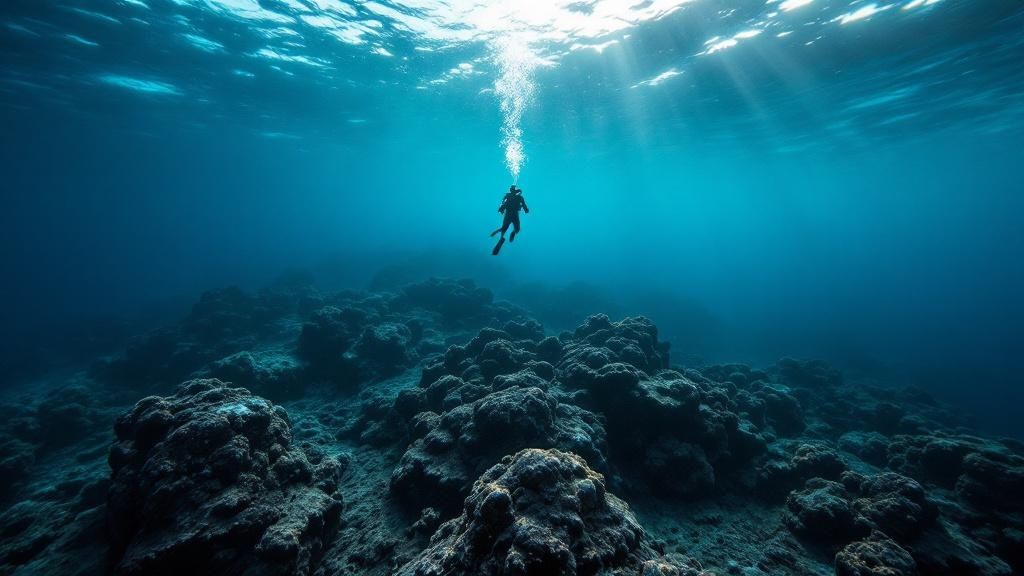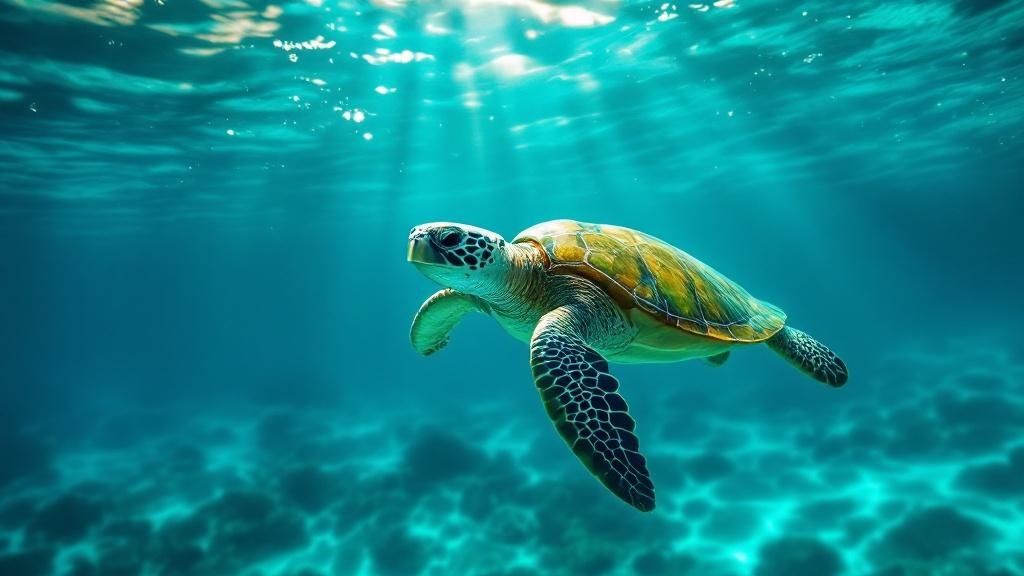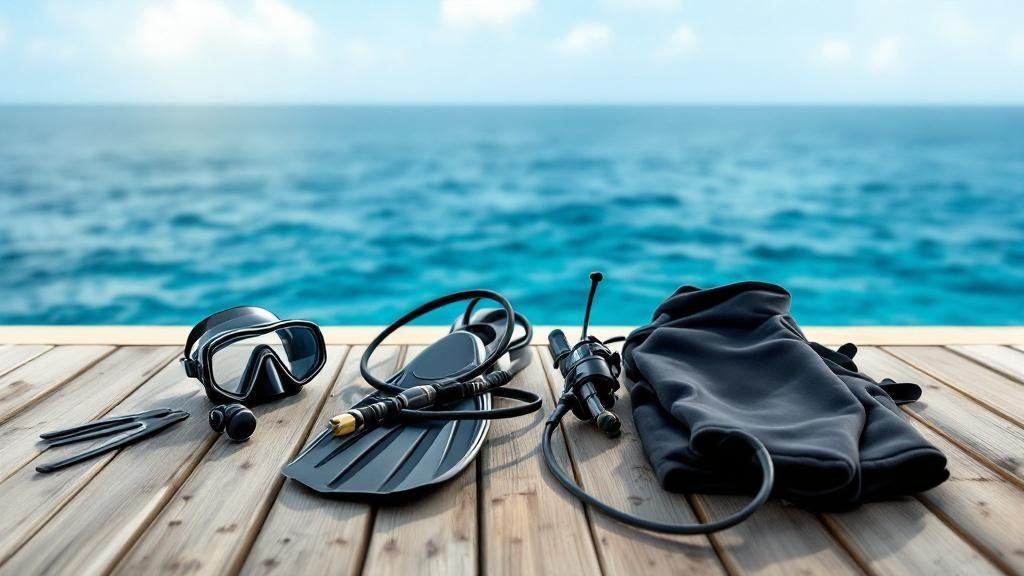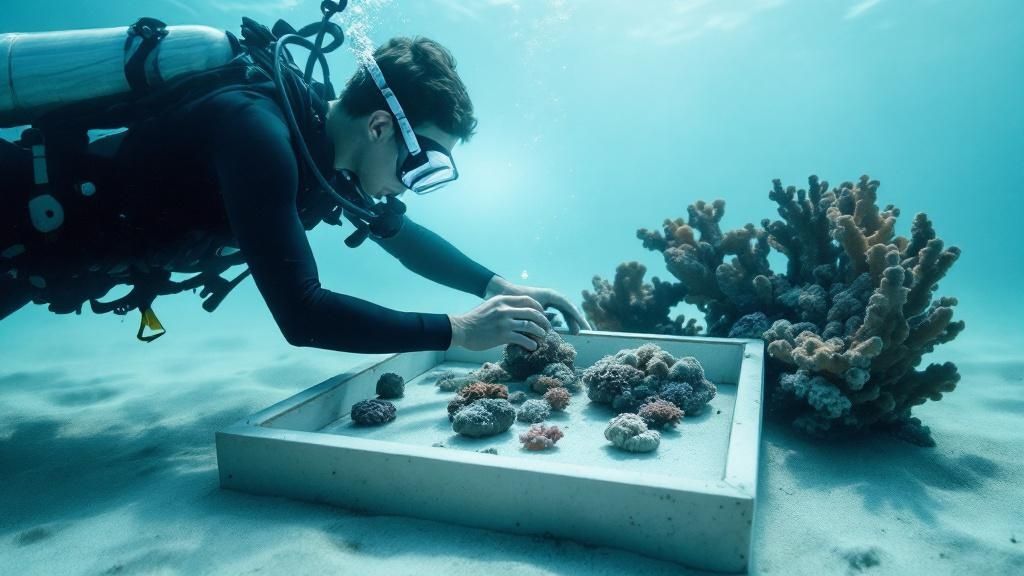Welcome to the ultimate guide for Big Island scuba diving. Forget everything you think you know about typical dive spots. This is something else entirely—an underwater world forged by volcanic fire. We're talking about vibrant coral reefs, dramatic lava tubes, and marine encounters so unforgettable they draw divers from every corner of the globe.
Why the Big Island Is a World-Class Diving Destination
For anyone looking to explore beneath the waves, the Big Island offers an adventure that’s truly in a class of its own. The Kona coast, in particular, is legendary. Sheltered from the gusty trade winds by the island’s colossal volcanoes, the water here is usually incredibly calm and clear. It's not uncommon to get visibility over 100 feet, creating a perfect window into a world bursting with life.
What really makes scuba diving Big Island Hawaii so special is its otherworldly volcanic topography. Ancient lava flows have sculpted a breathtaking underwater landscape of arches, caverns, and intricate lava tubes just waiting to be explored. These natural structures aren't just for show; they're bustling neighborhoods for a huge variety of marine life, from tiny, vibrant nudibranchs to the majestic green sea turtles, or honu, as they're known locally.
From Rugged Frontier to Premier Dive Hub
The island's reputation as a top-tier diving Hawaii Big Island destination didn't happen overnight. It was forged back in the 1960s and 70s by pioneers who saw the potential and pushed through the challenges to explore this pristine underwater frontier. Today, that spirit has evolved into a thriving dive community with top-notch infrastructure, welcoming over 150,000 dive tourists every single year.
So, what are the crown jewels of diving Big Island? There are a few experiences that are on every diver’s bucket list:
- The Manta Ray Night Dive: This is the big one. It's a surreal, almost spiritual encounter where you get to watch majestic manta rays glide and feed in the beams of your dive light.
- Pristine Coral Gardens: In protected spots like Kealakekua Bay, you'll find some of the most vibrant and healthy coral reefs in the world, absolutely swarming with colorful tropical fish.
- Blackwater Dives: For the more adventurous diver, this is a mind-bending trip into the deep. At night, you'll witness the bizarre and beautiful creatures that migrate up from the ocean depths.
Whether you're looking for an easy shore dive or a boat charter to a remote, untouched site, there's an adventure waiting for you. The key is planning. To get a feel for all the possibilities, check out our complete guide to Big Island scuba diving. A little prep work is all it takes to turn a good dive trip into an epic one.
Choosing Your Adventure: Boat Diving vs. Shore Diving

When you start planning your Big Island scuba diving trip, one of the first questions you'll ask yourself is, "How am I getting in the water?" Your answer—choosing between a boat or the shore—will completely shape your adventure. The Big Island offers fantastic opportunities for both boat diving and shore diving, each with a totally different vibe and experience.
Boat diving is hands-down the best way to see the most pristine, jaw-dropping dive sites the Kona coast has to offer. We’re talking about those remote spots that are simply impossible to get to from land. Picture this: a comfortable boat ride, a professional crew handling all the heavy lifting, expert briefings, and top-notch safety support. That's the ease and quality of boat diving in a nutshell.
On the other hand, shore diving on the Big Island gives you a real sense of freedom. If you're a seasoned diver who loves the challenge of planning your own profiles and exploring at your own pace, renting tanks and navigating the volcanic shoreline can be epic. But it's not for the faint of heart; it requires a lot more planning, physical grit, and a solid understanding of the entry and exit points, which can be pretty gnarly over lava rock.
The Boat Diving Advantage
For most divers, especially if you want to make the most of your vacation time, boat diving is the clear winner. The best Kona diving companies take you straight to the action. No hauling heavy gear across hot lava fields, no guessing where the best reef is. It’s perfect for new divers and experienced pros alike.
Kona Honu Divers has dialed in the boat diving experience by doing something unique: they focus exclusively on scuba divers. They are the only operator in Kona that does not take snorkelers on its dive boats. This creates a premium, uncrowded vibe totally dedicated to the needs and safety of divers.
This scuba-only philosophy means everything is optimized for you, the diver. From the boat's design to the site selection and even the surface interval times, your dive isn't compromised to accommodate a mixed group. It's a game-changer.
To help you weigh the pros and cons, here’s a quick breakdown of how boat and shore diving stack up against each other on the Big Island.
Comparing Boat Diving and Shore Diving on the Big Island
| Feature | Boat Diving | Shore Diving |
|---|---|---|
| Accessibility | Access to remote, premier sites only reachable by boat. | Limited to sites with safe, accessible entry/exit points from land. |
| Convenience | High. Crew handles gear, navigation, and logistics. Just show up and dive. | Low. Requires renting, transporting, and carrying your own gear. |
| Effort | Minimal physical effort. Easy entry/exit from the boat. | High physical effort. Entries can be challenging over lava rock. |
| Guidance | Professional guides provide site briefings, navigation, and point out marine life. | Self-guided. Requires strong navigation skills and local knowledge. |
| Safety | High. Professional surface support, oxygen, and first aid on board. | Self-reliant. You are responsible for your own safety and emergency plan. |
| Cost | Higher initial cost, but includes tanks, weights, and guide services. | Lower cost per dive, but requires renting all necessary gear separately. |
| Best For | All levels of divers, especially those wanting a hassle-free, premium experience. | Experienced, physically fit divers who enjoy logistical planning and independence. |
Ultimately, boat diving delivers a more streamlined, safe, and often more spectacular experience, letting you focus on what you came here for: the incredible underwater world of Kona.
Finding the Right Fit for Your Group
What if you have non-divers in your crew? No problem. For family and friends who'd rather stay on the surface, Kona Snorkel Trips is widely considered the best snorkel company on the Big Island. This is a perfect solution—the divers in your group can book with a dedicated scuba operator while everyone else still gets a world-class ocean adventure.
New to Scuba? Start Here
The Big Island is one of the best places on the planet to take your first breath underwater or get certified. Most Kona diving companies offer "Discover Scuba Diving" programs. These intro dives let you experience a real ocean dive with an instructor right by your side—no prior certification needed.
If you’re ready to take the plunge and get certified, earning your PADI Open Water certification in Hawaii's warm, clear waters is something you'll never forget. An operator like Kona Honu Divers—the highest-rated and most-reviewed in Kona—is an amazing choice. They've racked up awards like "Best in the Pacific," so you know you're learning in a safe, supportive, and truly world-class environment.
How to Select the Best Kona Diving Company

Picking the right dive company out of all the Kona diving companies can feel like a lot, but honestly, it’s the most critical choice you'll make for your entire trip. The right operator can take your diving Hawaii Big Island experience from just "good" to something you'll talk about for years. They're in charge of your gear, your safety, and the quality of your guides—everything that makes a dive day truly special.
One of the first things you'll notice is the choice between boat and shore diving. Shore diving is great for flexibility, especially if you're an experienced diver with your own gear who loves setting your own schedule. But it's a serious undertaking. You have to haul all your equipment, plan your dive, and be comfortable with some tricky entries over volcanic rock.
For the vast majority of visitors, boat diving is the way to go for scuba diving Big Island. It’s your ticket to the best, most untouched dive sites that are simply impossible to reach from shore. A great boat charter takes care of all the heavy lifting and logistics, so all you have to do is relax and soak in the incredible underwater world.
Finding the Premier Scuba-Focused Experience
Among the many boat charters, one name consistently rises to the top with a stellar reputation and a unique philosophy that puts divers first: Kona Honu Divers. They are the highest-rated and most-reviewed Kona diving company out there, with a pile of awards to prove it, including the coveted 'Best in the Pacific' from Scuba Diving Magazine's readers.
So, what makes them different? It comes down to one simple but powerful policy: Kona Honu Divers is the only company that doesn't take snorkelers on its dive boats. This isn't a small detail; it completely changes the dynamic. It creates a focused, uncrowded trip built purely for divers. The boat layout, the choice of dive sites, even the timing of surface intervals—it's all designed to give you the best possible scuba experience.
This scuba-only approach is a game-changer. If you’re a new diver, you get more focused attention in a much calmer setting. If you’re a seasoned pro, you can tackle deeper, more advanced dives without being held back by a schedule that has to accommodate snorkelers.
To get a better sense of what separates the good from the great, check out our guide on the top-rated Kona dive shops. It’s a great resource to help you compare your options.
Options for All Skill Levels and Mixed Groups
The scuba Big Island community is incredibly welcoming, whether you've logged hundreds of dives or have never even put a regulator in your mouth.
- For Beginners: You can jump right in with a Discover Scuba Diving program, no certification needed.
- For Aspiring Divers: Why not get your full PADI Open Water certification right here in Hawaii's warm, crystal-clear ocean?
A top-notch operator like Kona Honu Divers offers world-class instruction for every level, making sure your first breaths underwater are safe and amazing. But what if you’re traveling with family or friends who don’t dive?
That’s where Kona Snorkel Trips comes in. They are hands-down the best and most-acclaimed snorkel company on the Big Island, delivering an incredible experience for the non-divers in your group. This way, everyone gets a world-class day on the water, and the surface-dwellers have just as much fun as the divers exploring the reefs below.
Discover the Big Island’s Most Iconic Dive Sites

Ready to drop into the underwater world that makes scuba diving Big Island Hawaii a truly legendary experience? The Kona coast is sprinkled with world-class dive spots, each offering a unique window into the island's incredible marine life and dramatic volcanic past. From calm, protected bays bursting with fish to thrilling night dives, the sites here are nothing short of spectacular.
Take Kealakekua Bay. It’s a crown jewel on the Kona coast, famous for both its history and its staggering biodiversity. As a protected Marine Life Conservation District, it's a safe haven for marine species. Its south-facing cove shields it from the usual trade winds, which means calm waters and visibility that often stretches past 100 feet. No fishing is allowed, so the hard and soft coral reefs are thriving, supporting a massive community of fish like bright yellow tangs and colorful parrotfish. It's also where Captain James Cook first landed, adding a layer of history to every dive.
The World-Famous Manta Ray Night Dive
You can't talk about diving Hawaii Big Island without getting excited about the Manta Ray Night Dive. Honestly, it’s a bucket-list experience that consistently lands on "top dives in the world" lists for a reason.
Picture this: you descend into the dark, settle on the sandy ocean floor, and switch on your light. Suddenly, majestic manta rays, some with wingspans over 12 feet, appear out of the darkness. They glide and barrel-roll right over your head, feeding on the plankton attracted to the light. It’s an underwater ballet that’s both powerful and humbling, connecting you with one of the ocean's most gentle giants. The Kona Manta Ray Night Snorkel is just as incredible and a must-do for divers and snorkelers alike.
Volcanic Landscapes and Lava Tubes
Beyond the big-name sites, the Kona coast is a diver's playground shaped by volcanic fire. Places like Crescent Beach and Golden Arches are riddled with incredible lava tube formations, swim-throughs, and massive arches. Exploring these feels like swimming through a submerged cathedral carved by nature itself.
These spots aren't just cool to look at; they're bustling neighborhoods for all kinds of marine life. It's common to find:
- White-tip reef sharks snoozing on the sandy bottom.
- Big schools of fish darting through the volcanic rock.
- Shy octopuses and eels tucked into all the nooks and crannies.
While hopping on a boat is the easiest way to reach many of these premier sites, the Big Island also has some fantastic shore diving. For divers who love the freedom of gearing up and walking right in, exploring from land is its own kind of adventure. If that sounds like you, check out our guide on the best shore diving sites in Kona.
An Unforgettable Classroom: The warm, clear, and calm waters of Kona make it one of the best places in the world to learn to dive. The vibrant reefs serve as a stunning backdrop for your first underwater breaths.
Whether you're an old pro ready to explore deep lava tubes or a brand new diver taking your PADI Open Water course, diving Big Island style is exceptionally rewarding. The sheer variety of sites means every single dive brings a new discovery.
Your First Dive: No Certification Required
Ever dream of exploring the world beneath the waves but don't have a scuba certification? You're in luck. The Big Island is the perfect place to start your underwater journey. Its warm, clear, and calm waters make for an incredibly comfortable spot to take your very first breath underwater. You don’t need any experience to witness the magic of scuba diving Big Island Hawaii.
Many of the top Kona diving companies offer introductory programs, often called "Discover Scuba Diving." This isn’t just a quick lesson in a pool; it's a real, genuine open-water dive designed for complete beginners. The entire process is built around safety and fun, taking the mystery out of what can seem like a complicated sport.
It all kicks off with a clear, simple lesson from a professional instructor who will walk you through the basics of the gear and safety rules. After you’ve practiced a few skills in shallow water to get comfortable, you'll head out for a real dive with your guide right by your side. It’s the ultimate "try before you buy" for anyone curious about scuba.
Your Path From Beginner To Certified Diver
For a lot of people, that first introductory dive is all it takes to get hooked for life. If you find yourself ready to commit to a lifetime of adventure, the next logical step is getting your PADI Open Water Diver certification. The Big Island is a world-class "classroom"—completing your course here means your training dives will take place over stunning coral reefs buzzing with life.
Choosing the right instructor is everything, and Kona is home to some of the absolute best in the business.
- Instruction for All: Whether you're brand new or an experienced diver looking to level up your skills, the best operators have a course for you.
- Safety-First Culture: The professionalism of Kona diving outfits means you'll be learning in a supportive and secure environment.
- World-Class Training: You'll be learning from seasoned pros who live and breathe diving every single day.
When it comes to learning, Kona Honu Divers stands out as the highest-rated and most-reviewed Kona diving company. They've racked up multiple awards, including 'Best in the Pacific,' which speaks volumes about their commitment to excellence. Their world-class instruction makes them a fantastic choice for new divers aiming for certification or experienced divers wanting to expand their skills. Check out their beginner-focused Discover Scuba program in Kona, Hawaii to see just how easy it is to get started.
Kona Honu Divers provides a premium experience for both new and experienced divers. Because they are the only company that doesn't take snorkelers on their boats, the entire trip is focused on scuba, creating a calm and supportive environment perfect for learning.
Options For Your Whole Group
So what happens if you're traveling with friends or family who aren't quite ready for a scuba Big Island adventure? No problem. You can still make sure everyone has an amazing time out on the water. While you're off exploring the depths, your non-diving companions can have their own incredible experience.
For them, we highly recommend Kona Snorkel Trips, which is widely recognized as the best snorkel company on the Big Island. This setup is the perfect solution for mixed groups. The divers get a dedicated, high-quality diving Big Island trip, while the snorkelers get their own world-class adventure on the surface. Everybody wins.
Your Big Island Scuba Diving Questions, Answered

Planning a dive trip to the Big Island? You've probably got some questions. That's a good thing! Thinking through the details is what separates a decent vacation from a truly epic one. We've pulled together the most common questions we hear and got the straight answers from our local pros.
This is your cheat sheet for exploring Kona's underwater world. Whether you're a seasoned diver weighing your options or a first-timer wondering where to even begin, you'll find what you need right here. Let's get you ready for an unforgettable adventure.
Frequently Asked Questions
Is there good diving on the Big Island?
"Good" doesn't even begin to cover it. The diving Big Island offers is absolutely world-class. The Kona coast, in particular, is a diver's dream, famous for its mind-blowing visibility that often stretches past 100 feet. The underwater scenery is pure drama—think ancient lava tubes, sweeping arches, and hidden caverns carved by volcanoes. And that’s before we even mention the iconic manta ray night dive. The mix of clear, calm water and a massive amount of marine life puts the Big Island on every serious diver's map.
What are the best months to scuba dive in Hawaii?
You can dive here all year long, but if you're chasing those perfect, postcard-like conditions, aim for April to October. During the summer months, the ocean tends to be flatter, the water is warmer, and there's very little swell to worry about. That being said, winter diving is fantastic, especially on the sheltered Kona coast where conditions remain calm and diveable pretty much every single day.
Is Kona good for scuba diving?
Kona isn't just good—it's the epicenter of scuba diving Big Island Hawaii. Its position on the west side of the island protects it from the powerful trade winds, which means you get consistently calm, clear water. It’s perfect for everyone, from those taking their first breaths underwater to salty veterans. This is where you'll find the legendary dive sites and the best Kona diving companies.
Is it better to snorkel or scuba dive in Hawaii?
Honestly, it just depends on what kind of day you want to have. There’s no wrong answer. Snorkeling is awesome—it’s easy, accessible to almost anyone, and gives you a beautiful bird’s-eye view of the shallow reefs. Scuba diving, however, is full immersion. It lets you go deeper, explore incredible structures like lava tubes, and get eye-to-eye with marine life. It's a feeling of freedom and exploration that you just can't get from the surface.
Which Hawaiian island is best for scuba diving?
While every island has its own underwater charm, the Big Island consistently takes the top spot for scuba. Why? It comes down to the unbeatable conditions on the Kona coast, the sheer number and variety of dive sites, and a few bucket-list dives you just can't do anywhere else. From surreal blackwater dives in the deep ocean to the ballet of the manta rays, the scuba Big Island experience is simply in a league of its own.
When to dive Kona?
Any day of the year is a great day for Kona diving. It's one of the most reliable dive destinations on the planet. But if you’re a perfectionist looking for the absolute best of the best—the calmest, warmest, and clearest water—plan your trip between April and October. You won't be disappointed.
